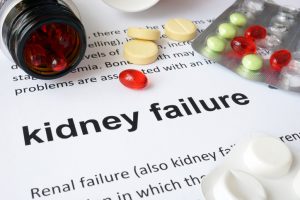
Acute kidney failure can develop rapidly. It is commonly seen in persons who are already hospitalized, specifically those who are critically ill or in intensive care.
Acute kidney failure can be a fatal condition, but it can be reversible, too.
Here we will outline the causes and symptoms of acute kidney failure.
Acute kidney failure causes
Acute kidney failure can occur when a person already has a condition that can slow down kidney function, when direct damage is experienced to the kidneys, or when the kidneys’ drainage tubes become blocked.
Causes of impaired blood flow to the kidneys include blood or fluid loss, blood pressure medications, heart attack, heart disease, infection, liver failure, use of aspirin or related drugs, severe allergic reactions, severe burns, and severe dehydration.
Causes that lead to kidney damage include blood clots in the veins, cholesterol deposits that block blood flow, inflammation of the tiny filters in the kidneys, premature destruction of red blood cells, infection, lupus or other autoimmune conditions, certain medications, multiple myeloma, scleroderma, blood disorders, toxins in the blood like alcohol, and inflammation of blood vessels.
There are also diseases and conditions that block urine passages, which can lead to acute kidney failure. These conditions include bladder cancer, blood clots in the urinary tract, cervical cancer, colon cancer, enlarged prostate, kidney stones, nerve damage, and prostate cancer.
Acute kidney failure symptoms
- Decreased urine output
- Fluid retention
- Drowsiness
- Shortness of breath
- Fatigue
- Confusion
- Nausea
- Seizures or coma in severe cases
- Chest pain or pressure
At the sign of any of these symptoms, you should see a doctor right away.
Acute kidney failure risk factors and complications
Factors that can increase a person’s risk of acute kidney failure include:
- Hospitalization, especially for a serious condition
- Old age
- Blockages in blood vessels
- Diabetes
- High blood pressure
- Heart failure
- Kidney disease
- Liver disease
Complications resulting from acute kidney failure include fluid retention, chest pains, muscle weakness, permanent kidney damage, and even death.
To reduce your risk of complications associated with acute kidney failure, it’s important that you see your doctor at the first sign of acute kidney failure.